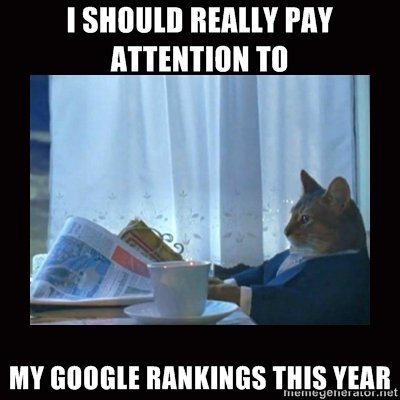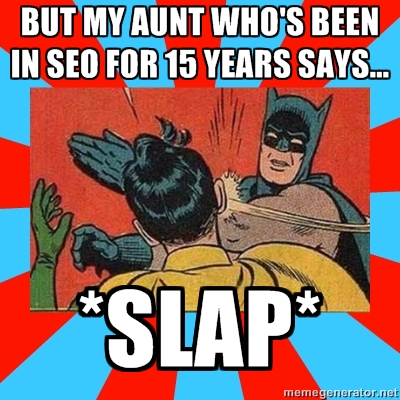You are viewing our site as an Agent, Switch Your View:
Agent | Broker Reset Filters to Default Back to ListReal Estate SEO is Dead and other Internet Misnomers of 2012
December 31 2013
Penguin and Panda algorithm updates really shook things up this year, and although there is plenty of talk about how to recover, real estate professionals should understand that recovery is really a buzzword. The real focus should be on making good decisions moving forward in your real estate marketing. Google will continue to make algorithm changes, so it's important to diversify your marketing channels so if one gets hit, you don't disappear from the web.
 Many people still don't understand what Google's search engine really is or what it does. Bear with me, it's important to understand a least a little bit. In extremely simple terms, a search engine algorithm is a mathematical set of instructions that tells computers how to do things. Google's algorithms are important because they tell Google's search engine how to rank web pages for keywords. Google uses keywords on web pages to decide which pages to return to Googlers looking up information about a specific subject. Google's bots or spiders (which are programs) crawl the web going from link to link constructing the index. The index is what we see when we search the web using Google.
Many people still don't understand what Google's search engine really is or what it does. Bear with me, it's important to understand a least a little bit. In extremely simple terms, a search engine algorithm is a mathematical set of instructions that tells computers how to do things. Google's algorithms are important because they tell Google's search engine how to rank web pages for keywords. Google uses keywords on web pages to decide which pages to return to Googlers looking up information about a specific subject. Google's bots or spiders (which are programs) crawl the web going from link to link constructing the index. The index is what we see when we search the web using Google.
How Google ranks pages for keywords is not simple at all anymore. Google says: create worthwhile, quality content and provide a good user experience. They say that, but it's not exactly true. They just want you to think it is. Actually, Google has no direct way to judge the quality of content. While they say it's important, and it is very important to your site visitors, they have no algorithm that can grade the quality of your content. The quality is inferred by the amount of content on the page, the profile of back links, the number of people that use your exact domain name to access your site, if there exists keyword stuffing and how people interact socially with the content on your site.
Google is now protecting their core algorithm of using page authority and relevancy from being manipulated. One can think of Panda and Penguin as the enforcers or guards that are protecting page authority and relevancy.
Prior to Penguin, relevancy was given great weight as a ranking signal. It was so strong that using keyword focused anchor text could easily over compensate or bypass other weak ranking signals on the site. Because Penguin is the correction for this loophole, it is now more important to scale down keyword anchor texts to about 10%, especially on a weak site. Panda was a strong correction for weak sites that were able to rank high bencause of using link networks, thin content, spun content, non-original content, and the over use of keywords.
The Panda update is about eliminating the junk, so there's something to think about if you have a few good pages on your site but have one hundred more that are offered free through your real estate website developer, like "Free relocation information" or "What is a short sale." If that content is on 5000 other sites, get it off your site because that can drag you down. It can be seen as a spam flag for Google.
Panda and Penguin are being released in roll-outs. These are bite sized chunks of mayhem that are Google's way of refining the algorithms. Low quality or thin content is getting sifted out with each Panda and Penguin tweak or roll-out, so those of you that have been spamming it up without seeing any negative consequences...wait. If you have really been hit because you have been doing spammy things to your site, there are some options to wipe the slate clean and get on with the business of getting Internet traffic and leads, but it will take quite a bit of work. For an analysis, find out more on Dynamicpagesolutions.com.
If you know you've been hit by Panda, you have to start analyzing the content on your web pages and significantly enhancing or eliminating the "thin" content pages on your site. Remove onsite duplicate content completely. Since Panda's being tweaked all the time, it may take several or more data refreshes to notice any improvement, if you ever do.
If you want to write good content, stay away from generalizations. Write about facts and figures. Pull up Google maps and include proper names of parks and schools and businesses and employers in the area where you market. Include the names of developments, lots of information about the area where you want to market and capture traffic. Stay away from shallow and easy because you're really wasting your time. Nobody wants to read another rehash of a Wikipedia article. Take it really easy on the keyword usage, as well, particularly on site.
 What is Penguin all about? Unfortunately, spam works for a time...until Google figures it out. This algorithm is more about adjusting results. Penguin launched in April of this year and it's really impacted the world of search engine optimization like no other. It is meant to combat keyword stuffing, link schemes (and Google's interpretation of link schemes is broad), and purposeful duplicate content, all as it relates to manipulating rankings. That goes against Google's updated webmaster guidelines, so there's really no crying allowed on this one, although there's been buckets of tears shed because of it.
What is Penguin all about? Unfortunately, spam works for a time...until Google figures it out. This algorithm is more about adjusting results. Penguin launched in April of this year and it's really impacted the world of search engine optimization like no other. It is meant to combat keyword stuffing, link schemes (and Google's interpretation of link schemes is broad), and purposeful duplicate content, all as it relates to manipulating rankings. That goes against Google's updated webmaster guidelines, so there's really no crying allowed on this one, although there's been buckets of tears shed because of it.
What's a link scheme? Link schemes sound dirty--like only cheaters and spammers would do this, but it's actually most of us. In particular, the links scheme explanation on Google's webmaster tools looks frighteningly like every do-it-yourself optimization guide on the web, including ours, and I think this warrants a close look.
Scratch everything you've heard or learned about link building, including what we've taught in the past. The landscape has really changed. Always, since the dawn of Google manipulation, if you want to rank for a keyword, you did so by creating links that point to your site via blog posts, directory links, tweets, or whatever by using terms like "Chandler Homes for Sale" or "Oklahoma City Real Estate" as your linking text. That's the clickable link within content that links to a specific page that you're trying to optimize for or promote. This helped to attribute relevance to the receiving page and tell Google, "Hey this page is all about [city] real estate for sale and lots of other people think it's nifty and valuable and that's why there's links pointing to it that support that idea." In a post-Penguin world, if that's all you have going for you, you've probably already been banished to page one hundred for your "money keywords."
There is a new strategy and a much safer approach when you do link building. Google doesn't want us to build links, they want links to occur naturally because a site's content is awesome and it deserves to be shared or linked to. The problem, though, is that's just not most of us. Using exact match anchor text (money keywords) should be limited to about 10% of your offsite links. The rest of the time, use links that are branded or generic links. If you have a ton of links out there that are exact match keywords, I would recommend that you clean them up by going into accounts where they were created and updating them to be in line with the Penguin update.
Link schemes also include forum comments with keyword optimized anchor text in the signature. I don't believe that Google is going to punish you if you have your domain, business or team name in your signature, but if your signature looks like an advertisement for homes for sale instead of a person, update any online accounts that have your signature to be less spammy.
Comment spam should be addressed both off site and on site, meaning that if you have a blog and auto approve every comment, but all your comments are from spammers with a ton of links or keywords embedded, you might get into issues for being a host for spammers, so manually oversee what kind of comments you're approving.
Penguin and Panda are about keyword stuffing. Keyword stuffing is really a bad technique for ranking and Google's always warned and threatened, but now they're making good on those threats.
 People still keyword stuff because they've heard that keywords are good and you need keywords to rank on Google. While it's true, excessively repeating the same keyword or instances or versions of a keyword on a page is a practice that will hurt you. If you're relying on this strategy for ranking, clean it up. Not to say that you should remove keywords from your site; that would be impractical, because without keywords and themes, Google can't get a good sense of what pages are about. However, if you're following methods that say use a keyword five times for every 300 words, this is not a good idea and Google has algorithmically addressed the issue.
People still keyword stuff because they've heard that keywords are good and you need keywords to rank on Google. While it's true, excessively repeating the same keyword or instances or versions of a keyword on a page is a practice that will hurt you. If you're relying on this strategy for ranking, clean it up. Not to say that you should remove keywords from your site; that would be impractical, because without keywords and themes, Google can't get a good sense of what pages are about. However, if you're following methods that say use a keyword five times for every 300 words, this is not a good idea and Google has algorithmically addressed the issue.
There's really no reason to overuse keywords. If you're adding content, make it appear natural. Don't force keywords, especially if it makes the content awkward. When writing naturally, keywords will have their place within the context of the content without trying to copy some magical formula. In that respect, Google's actually made it a lot easier if your intent is to produce good content.
Stuffing a ton of keywords in your meta tags or on the website backend has been a very poor practice for a long time, but I still see people doing it, thinking that this will help their ranking and not realizing that it is more likely than ever before to cause a loss in rankings.
Google released a tool very recently as way for people to, in essence, unclaim links pointing to their sites. Called Disavow, Google developed this tool because a lot of webmasters were legitimately concerned that the Penguin update left a very large loophole for mischief makers, or as some like to call them, the competition, to hire spammy SEO companies to firebomb their site with exact match anchor text links from porn sites or gambling sites or what are generally known as bad neighborhoods.
Disavow is what you use after you've fixed everything that you can. It's the last Hail Mary if you ever want to get back into good graces as you move forward. Disavow should be used cautiously and carefully. If you have some really bad stuff out there and you have no way to remove spam links yourself, look into this, but the use of Disavow should not apply to most people.
So what's the future of SEO?
 SEO always has been about good marketing. Because it's so important to rank well for keywords, we're compelled to try gimmicks and tricks because spending time and money on marketing is a hard way to go, particularly as the Internet gets more and more competitive.
SEO always has been about good marketing. Because it's so important to rank well for keywords, we're compelled to try gimmicks and tricks because spending time and money on marketing is a hard way to go, particularly as the Internet gets more and more competitive.
If you want to research safe practices or find advice online, I'd highly recommend that you use dates in your search query, because SEO best practices in early 2011 are vastly different from today. Also, be careful when following advice or hiring an SEO specialist or even a social media agency. You've really got to be sure that they are reputable, because good marketing costs money or effort. Good content costs money, hiring somebody that's really going to understand your business is going to be a tall order to fill because it's not just about links anymore. Someone that really doesn't understand your marketing message or your market isn't going to be able to do what they need to do. Choosing a reputable real estate SEO company to do the work for you is important so you have a sound strategy moving into 2013. Making the commitment to diversify, engage and become educated is a reliable way to survive future algorithm changes.
To view the original article, visit the Dynamic Page Solutions blog.









